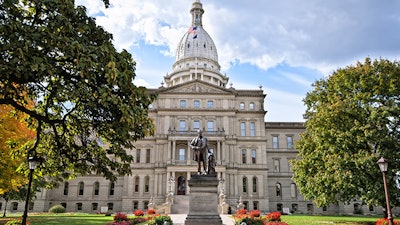
The Michigan Comprehensive Cannabis Law Reform Committee (MI Legalize) will take an appeal over ballot petition signatures to the U.S. Supreme Court, according to Jeff Hank, chairman of the group. The action means the measure will probably not be on the 2016 November ballot.
The decision comes after Michigan’s supreme court denied an emergency appeal by Hank to challenge a lower court’s ruling against the group Sept. 7. MI Legalize brought the suit against the state’s Board of Canvassers for a failure to appropriately count voter signatures in June (which CBT covered in-depth here.)
“This is a gross travesty and a grave miscarriage of justice,” says Hank. “We collected enough signatures of registered Michigan voters to place what would’ve been the best marijuana legalization petition in the United States here in Michigan. Our petition was extremely popular. If we were on the ballot, we would win.”
MI Legalize turned in about 354,000 signatures, over the state’s required 252,523. The Michigan Board of Canvassers pointed to a policy that voter signatures older than 180 days must be verified either by an affidavit from the original signer or through verification by the individual county clerks. MI Legalize’s lawsuit requested that they rely on Michigan’s digital Qualified Voter File to check the veracity of the petitioners. The Michigan Court of Claims stood behind the current policy (which was signed into state law May 25 of this year) and denied use of the voter file, as well as any order to compel clerks to check the signatures.
MI Legalize worked with Practical Political Consulting to check the petition signatures against the Qualified Voter File (which is public record) to analyze “almost every signature we had” according to Hank.
“We were able to use the state’s own database, which is public, to show that all these people are registered to vote,” says Hank. “We know they’re valid … but they’re saying we have to use this policy that they know is impossible to comply with.”
As a campaign, MI Legalize will appeal to the U.S. Supreme Court, but the deadline for the November ballot is coming up quickly. Ballots for overseas veterans will be mailed Sept. 24. The group has 90 days to appeal the case, but there is some discussion within MI Legalize as to whether they should push to make this year’s ballot or continue to build the case and try for a later election, says Hank.
“Even though it’s a high barrier to get relief from the U.S. Supreme Court, we’re still holding out hope that maybe there’s time for this year, although the clock is very quickly winding down,” he says.
If the court challenge is ultimately unsuccessful, MI Legalize will start another initiative, he says.
“Our Plan B is to run another initiative. We have the framework. We have the organization. We know how to do it,” he says. “We’re going to keep going. We’ve got a great organization here.”
The decision comes after Michigan’s supreme court denied an emergency appeal by Hank to challenge a lower court’s ruling against the group Sept. 7. MI Legalize brought the suit against the state’s Board of Canvassers for a failure to appropriately count voter signatures in June (which CBT covered in-depth here.)
“This is a gross travesty and a grave miscarriage of justice,” says Hank. “We collected enough signatures of registered Michigan voters to place what would’ve been the best marijuana legalization petition in the United States here in Michigan. Our petition was extremely popular. If we were on the ballot, we would win.”
MI Legalize turned in about 354,000 signatures, over the state’s required 252,523. The Michigan Board of Canvassers pointed to a policy that voter signatures older than 180 days must be verified either by an affidavit from the original signer or through verification by the individual county clerks. MI Legalize’s lawsuit requested that they rely on Michigan’s digital Qualified Voter File to check the veracity of the petitioners. The Michigan Court of Claims stood behind the current policy (which was signed into state law May 25 of this year) and denied use of the voter file, as well as any order to compel clerks to check the signatures.
MI Legalize worked with Practical Political Consulting to check the petition signatures against the Qualified Voter File (which is public record) to analyze “almost every signature we had” according to Hank.
“We were able to use the state’s own database, which is public, to show that all these people are registered to vote,” says Hank. “We know they’re valid … but they’re saying we have to use this policy that they know is impossible to comply with.”
As a campaign, MI Legalize will appeal to the U.S. Supreme Court, but the deadline for the November ballot is coming up quickly. Ballots for overseas veterans will be mailed Sept. 24. The group has 90 days to appeal the case, but there is some discussion within MI Legalize as to whether they should push to make this year’s ballot or continue to build the case and try for a later election, says Hank.
“Even though it’s a high barrier to get relief from the U.S. Supreme Court, we’re still holding out hope that maybe there’s time for this year, although the clock is very quickly winding down,” he says.
If the court challenge is ultimately unsuccessful, MI Legalize will start another initiative, he says.
“Our Plan B is to run another initiative. We have the framework. We have the organization. We know how to do it,” he says. “We’re going to keep going. We’ve got a great organization here.”

























